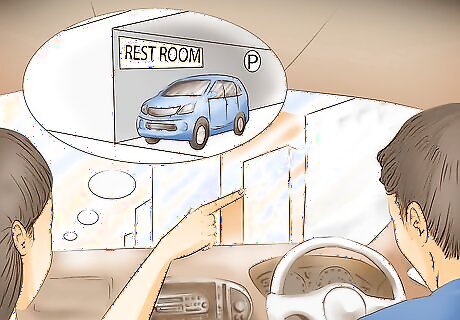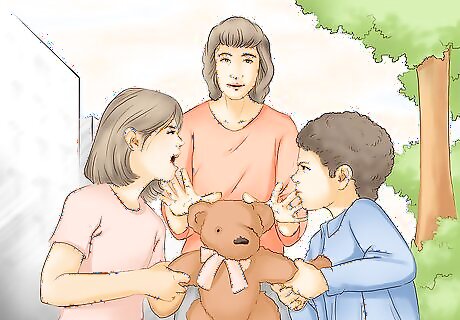
views
Planning Your Trip

Plan living arrangements. With a family, it's often best to do a vacation rental instead of a hotel room so that kids and adults can sleep comfortably and on different schedules. If you are traveling with one or more families, decide what arrangements would be best for everyone. You may want accommodations that include a kitchen and a washer/dryer. This can help keep expenses lower and provide some space when needed. Decide if it's best for everyone to stay in one place or whether it's better to get multiple arrangements. Decide if the kids will sleep together and what sleeping and living arrangements make the most sense.

Discuss the budget. Prior to your travels, decide what kind of budget you need to live within and make sure it is compatible with other families. For example, if you want to stay in budget hotels but others want to stay in all-inclusive resorts, this may pose a problem. Decide on how you will eat out together: will each family have separate checks or will you take turns paying? How will you divide groceries and other necessities while traveling? Find a way so that everyone's needs are fulfilled. If budgets differ significantly, consider staying in different accommodations or having days where families split up and do different activities.

Pack smart. Think about all the things you can do without or share with other families. For example, instead of bringing three strollers for three babies, talk about bringing one or two strollers altogether and bringing a baby carrier instead. You may be able to rent child or baby items like strollers or bed items. You might buy items or have them mailed or delivered to you once you arrive. Minimizing your stuff means less risk of things getting lost. Remember essential items important to you and your family, like a nightlight or a bedtime playlist for your kids. These small elements can help your child feel safe and comfortable.

Plan activities ahead of time. Agree on as much as you can prior to the trip. Having several people involved can make decision-making difficult, especially if it's a decision you need to make right now. To avoid the pressure and potential disagreements, decide on major decisions ahead of time. Choose your lodging, food preparation, and activities well in advance to avoid feeling on-the-spot or in the middle of problems. Have everyone throw out ideas well in advance, then come together as a group to decide what to pursue. Consider making lists of potential activities that are distributed to all the families in advance. Then the lists can be shortened later.

Set ground rules ahead of time. Discuss ground rules with the other families ahead of time. For example, for the children, ground rules may have to do with behaviors that are expected and encouraged, as well as specific behaviors that will not be tolerated. This will also help minimize the appearance of taking sides or playing favorites. It introduces fairness and objectivity into a potentially conflictual situation. For adults, clear spending limits and clearly labeled blocks of unstructured time could also add to harmony. The more clarity there is in the planning phase, the greater the likelihood of consensus. And add as much concreteness as possible in the form of lists, behaviors, etc. This will decrease the possibility of remembering differently. Review these at the start of the trip to ensure everyone understands the rules.
Managing Travel Time

Plan travels around the kids' schedule. If you're driving, hit the road when their nap time begins, or start driving at night so the kids will be asleep. This can minimize car squabbles or upsets. If you're flying, this can be a bit trickier. Make sure the kids are fed, slept well, and not in the middle of naptime. Ask about the other kids' schedules and needs and plan travel around all the kids as much as possible.

Stop frequently. If there are lots of kids, plan for lots of bathroom breaks, snack breaks, and moving around. Kids may start to get antsy or cranky if not given opportunities to stretch their legs. Plan to stop every few hours to accommodate these needs. You may want to divide the cars by children's age group so that younger kids sit together and older kids sit together. This may minimize squabbles and make break times more predictable based on their needs.

Prepare travel bags. Create special travel bags for the trip that include snacks, extra clothes, something to drink, and activities for the kids. Bring fun, easy to eat snacks (that aren't entirely messy), juice boxes and plenty of water, diapers, and anything else that may be necessary in the car. If children need medication, make sure it's handy so you don't have to go digging for it. Pack plenty of toys and make sure each child has several toys to choose from. Consider swapping the children's toys so that your children play with the other children's toys and vice versa. This is almost like getting new toys but is much simpler. Just make sure the children agree to this first.

Cope with the unexpected. When lots of people are involved, it's difficult to manage setbacks, delays, and unexpected events. Even when you plan months in advance, you can't plan for road closures, car issues, or health problems. If you have several adults available, delegate responsibilities. Do your best to remain calm and take care of any needs. For example, if a child is sick and needs immediate care, have one or two adults accompany the child and have everyone else continue with the plans. Pack extra food and water in case of emergencies. You may want to pack blankets, too.
Enjoying Your Time Together

Resolve conflicts quickly. There will likely be times when you get annoyed, frustrated, or irritated while on your trip. When kids are present, they will likely have meltdowns, fights, or other behavior problems while traveling. One way to minimize conflict is to communicate clearly what expectations are in place and how to express oneself respectfully. Do your best to ease any tensions as quickly as they come up in order to avoid them growing into massive problems and ruining your trip. You can do a quick review of one or more of the ground rules that best apply to the situation. Confront problems in a calm, solution-focused manner. For example, instead of saying, “Stop wiping your snot everywhere!” say, “Here's a tissue if you'd like to wipe your nose.” Let children know that whining is not tolerated. If you have a problem with another parent disciplining your child, let them know to get you if your child needs discipline.

Find activities everyone will enjoy. When traveling with other families, make sure you want to do similar activities. If one family wants to rest and relax while the other wants to do lots of activities and sight-seeing, this may cause problems or make kids feel left out. When planning activities, get a firm yes from those involved. Incompatibility in activities can cause tensions and disruptions on trips. If you differ greatly on activities you want to do, consider doing a few scheduled activities together and spending the rest of the time with your own family. For example, you may have one day devoted to taking the kids to the water park all together and another day to a sports game but spend time separately otherwise.

Avoid over scheduling. In an effort to try to keep everyone happy or entertained, you may overbook your trip, which can lead to overtired children, exhausted adults, and plenty of grumpiness. If you plan a day at a theme park, expect a low-key day afterward. Plan activities based on children's ages and what they can handle. A child who typically takes a nap may have a difficult time being out all day. Discuss these factors with the other families to keep scheduling appropriate. Make a tentative schedule and go over it all together. Make sure it works well for all members and make any accommodations necessary. Remember to shorten longer tentative lists.

Create sleeping rules. Put all the children who go to bed early together in one room or one part of the room. If children wake up early, let them know not to disturb others. Let early risers know what they can do in the morning; for instance, they may watch TV or make breakfast, but they are not allowed to wake up parents or other children. Consider putting all of the children in one room or divide up rooms by age or sleep schedule.
Spending Time Separately

Plan time apart. Whether this means staying in separate housing or spending a day or two on your own with your family, spending time apart can help break up any building tensions or discomforts that accumulate over time. If you dread spending every moment with someone else's kids or spending all day and all night with other adults, have days where you can take time for yourself or just your own family. This can mean taking a hike together or going horseback riding together. You may want to have a beach day or craft day.

Share babysitting responsibilities. If the adults want to check out a bar or other event or activity, step out a few at a time while the others stay with the kids, then switch off. Or, you can choose to take certain nights off to spend time with your partners separately while the other parents stay behind. Do whatever works best for you, but don't feel like you have to spend all of your time with kids all day long.

Take some alone time. Being around lots of people can be draining, and it may be important for you to have some time to yourself in order to keep your sanity. Take some time early in the morning or late at night just for yourself. Read a book, have a cup of coffee or tea, or take a bath. If it's difficult for you to be around lots of people for a long time, make sure you get that alone time in. It can help you reset and feel more calm in the midst of chaos. Plan an early morning walk by yourself. Consider attending a local yoga class or meditation class. You can also get a massage.



















Comments
0 comment